Mental Health Conditions
VerifiedAdded on 2023/01/18
|10
|3048
|60
AI Summary
This essay discusses the case of Lisa, a girl suffering from mental health conditions, and explores the concept of trauma-informed care. It examines her symptoms, the principles of trauma-informed care, and the role of nurses and psychiatrists in her treatment.
Contribute Materials
Your contribution can guide someone’s learning journey. Share your
documents today.
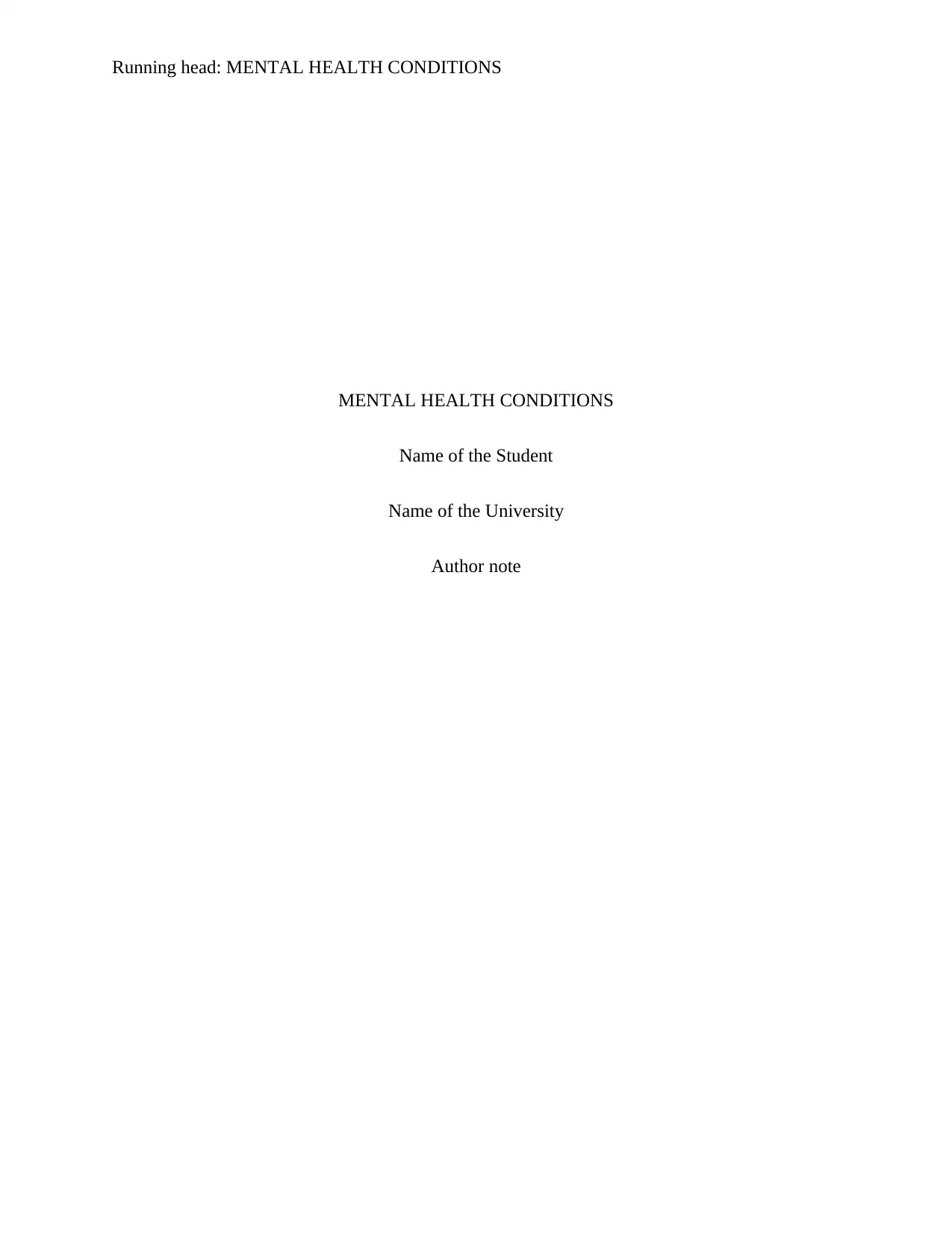
Running head: MENTAL HEALTH CONDITIONS
MENTAL HEALTH CONDITIONS
Name of the Student
Name of the University
Author note
MENTAL HEALTH CONDITIONS
Name of the Student
Name of the University
Author note
Secure Best Marks with AI Grader
Need help grading? Try our AI Grader for instant feedback on your assignments.
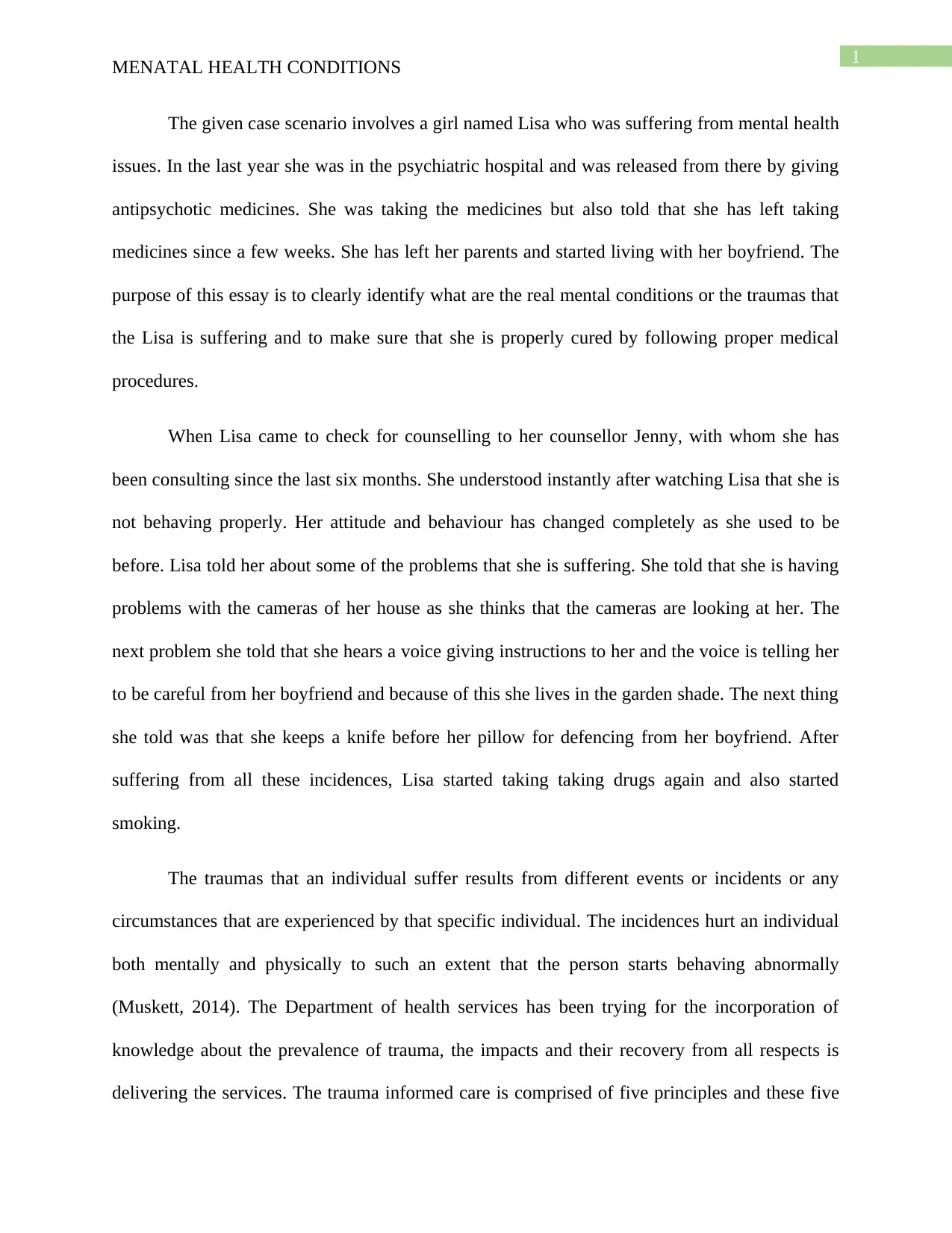
1
MENATAL HEALTH CONDITIONS
The given case scenario involves a girl named Lisa who was suffering from mental health
issues. In the last year she was in the psychiatric hospital and was released from there by giving
antipsychotic medicines. She was taking the medicines but also told that she has left taking
medicines since a few weeks. She has left her parents and started living with her boyfriend. The
purpose of this essay is to clearly identify what are the real mental conditions or the traumas that
the Lisa is suffering and to make sure that she is properly cured by following proper medical
procedures.
When Lisa came to check for counselling to her counsellor Jenny, with whom she has
been consulting since the last six months. She understood instantly after watching Lisa that she is
not behaving properly. Her attitude and behaviour has changed completely as she used to be
before. Lisa told her about some of the problems that she is suffering. She told that she is having
problems with the cameras of her house as she thinks that the cameras are looking at her. The
next problem she told that she hears a voice giving instructions to her and the voice is telling her
to be careful from her boyfriend and because of this she lives in the garden shade. The next thing
she told was that she keeps a knife before her pillow for defencing from her boyfriend. After
suffering from all these incidences, Lisa started taking taking drugs again and also started
smoking.
The traumas that an individual suffer results from different events or incidents or any
circumstances that are experienced by that specific individual. The incidences hurt an individual
both mentally and physically to such an extent that the person starts behaving abnormally
(Muskett, 2014). The Department of health services has been trying for the incorporation of
knowledge about the prevalence of trauma, the impacts and their recovery from all respects is
delivering the services. The trauma informed care is comprised of five principles and these five
MENATAL HEALTH CONDITIONS
The given case scenario involves a girl named Lisa who was suffering from mental health
issues. In the last year she was in the psychiatric hospital and was released from there by giving
antipsychotic medicines. She was taking the medicines but also told that she has left taking
medicines since a few weeks. She has left her parents and started living with her boyfriend. The
purpose of this essay is to clearly identify what are the real mental conditions or the traumas that
the Lisa is suffering and to make sure that she is properly cured by following proper medical
procedures.
When Lisa came to check for counselling to her counsellor Jenny, with whom she has
been consulting since the last six months. She understood instantly after watching Lisa that she is
not behaving properly. Her attitude and behaviour has changed completely as she used to be
before. Lisa told her about some of the problems that she is suffering. She told that she is having
problems with the cameras of her house as she thinks that the cameras are looking at her. The
next problem she told that she hears a voice giving instructions to her and the voice is telling her
to be careful from her boyfriend and because of this she lives in the garden shade. The next thing
she told was that she keeps a knife before her pillow for defencing from her boyfriend. After
suffering from all these incidences, Lisa started taking taking drugs again and also started
smoking.
The traumas that an individual suffer results from different events or incidents or any
circumstances that are experienced by that specific individual. The incidences hurt an individual
both mentally and physically to such an extent that the person starts behaving abnormally
(Muskett, 2014). The Department of health services has been trying for the incorporation of
knowledge about the prevalence of trauma, the impacts and their recovery from all respects is
delivering the services. The trauma informed care is comprised of five principles and these five
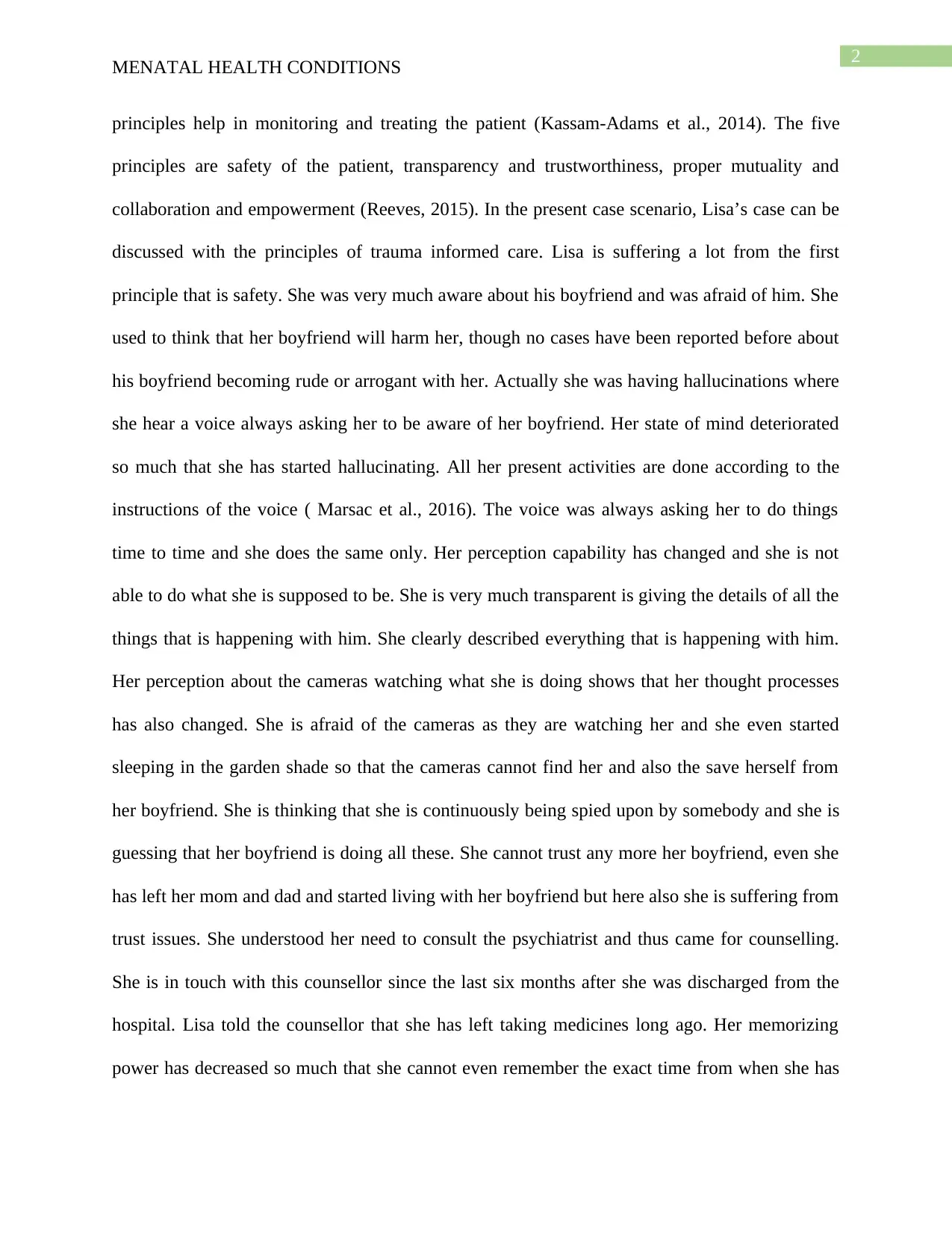
2
MENATAL HEALTH CONDITIONS
principles help in monitoring and treating the patient (Kassam-Adams et al., 2014). The five
principles are safety of the patient, transparency and trustworthiness, proper mutuality and
collaboration and empowerment (Reeves, 2015). In the present case scenario, Lisa’s case can be
discussed with the principles of trauma informed care. Lisa is suffering a lot from the first
principle that is safety. She was very much aware about his boyfriend and was afraid of him. She
used to think that her boyfriend will harm her, though no cases have been reported before about
his boyfriend becoming rude or arrogant with her. Actually she was having hallucinations where
she hear a voice always asking her to be aware of her boyfriend. Her state of mind deteriorated
so much that she has started hallucinating. All her present activities are done according to the
instructions of the voice ( Marsac et al., 2016). The voice was always asking her to do things
time to time and she does the same only. Her perception capability has changed and she is not
able to do what she is supposed to be. She is very much transparent is giving the details of all the
things that is happening with him. She clearly described everything that is happening with him.
Her perception about the cameras watching what she is doing shows that her thought processes
has also changed. She is afraid of the cameras as they are watching her and she even started
sleeping in the garden shade so that the cameras cannot find her and also the save herself from
her boyfriend. She is thinking that she is continuously being spied upon by somebody and she is
guessing that her boyfriend is doing all these. She cannot trust any more her boyfriend, even she
has left her mom and dad and started living with her boyfriend but here also she is suffering from
trust issues. She understood her need to consult the psychiatrist and thus came for counselling.
She is in touch with this counsellor since the last six months after she was discharged from the
hospital. Lisa told the counsellor that she has left taking medicines long ago. Her memorizing
power has decreased so much that she cannot even remember the exact time from when she has
MENATAL HEALTH CONDITIONS
principles help in monitoring and treating the patient (Kassam-Adams et al., 2014). The five
principles are safety of the patient, transparency and trustworthiness, proper mutuality and
collaboration and empowerment (Reeves, 2015). In the present case scenario, Lisa’s case can be
discussed with the principles of trauma informed care. Lisa is suffering a lot from the first
principle that is safety. She was very much aware about his boyfriend and was afraid of him. She
used to think that her boyfriend will harm her, though no cases have been reported before about
his boyfriend becoming rude or arrogant with her. Actually she was having hallucinations where
she hear a voice always asking her to be aware of her boyfriend. Her state of mind deteriorated
so much that she has started hallucinating. All her present activities are done according to the
instructions of the voice ( Marsac et al., 2016). The voice was always asking her to do things
time to time and she does the same only. Her perception capability has changed and she is not
able to do what she is supposed to be. She is very much transparent is giving the details of all the
things that is happening with him. She clearly described everything that is happening with him.
Her perception about the cameras watching what she is doing shows that her thought processes
has also changed. She is afraid of the cameras as they are watching her and she even started
sleeping in the garden shade so that the cameras cannot find her and also the save herself from
her boyfriend. She is thinking that she is continuously being spied upon by somebody and she is
guessing that her boyfriend is doing all these. She cannot trust any more her boyfriend, even she
has left her mom and dad and started living with her boyfriend but here also she is suffering from
trust issues. She understood her need to consult the psychiatrist and thus came for counselling.
She is in touch with this counsellor since the last six months after she was discharged from the
hospital. Lisa told the counsellor that she has left taking medicines long ago. Her memorizing
power has decreased so much that she cannot even remember the exact time from when she has
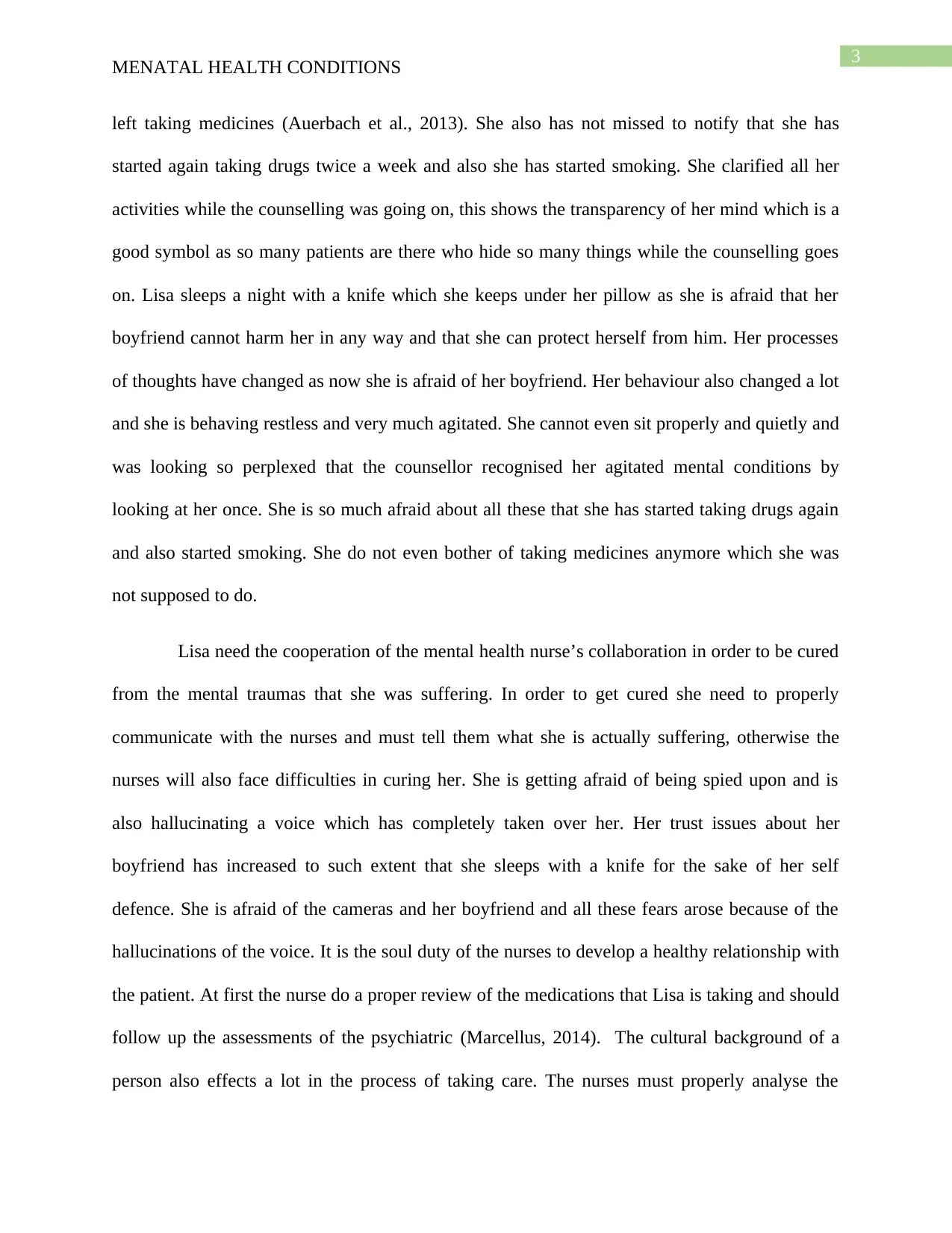
3
MENATAL HEALTH CONDITIONS
left taking medicines (Auerbach et al., 2013). She also has not missed to notify that she has
started again taking drugs twice a week and also she has started smoking. She clarified all her
activities while the counselling was going on, this shows the transparency of her mind which is a
good symbol as so many patients are there who hide so many things while the counselling goes
on. Lisa sleeps a night with a knife which she keeps under her pillow as she is afraid that her
boyfriend cannot harm her in any way and that she can protect herself from him. Her processes
of thoughts have changed as now she is afraid of her boyfriend. Her behaviour also changed a lot
and she is behaving restless and very much agitated. She cannot even sit properly and quietly and
was looking so perplexed that the counsellor recognised her agitated mental conditions by
looking at her once. She is so much afraid about all these that she has started taking drugs again
and also started smoking. She do not even bother of taking medicines anymore which she was
not supposed to do.
Lisa need the cooperation of the mental health nurse’s collaboration in order to be cured
from the mental traumas that she was suffering. In order to get cured she need to properly
communicate with the nurses and must tell them what she is actually suffering, otherwise the
nurses will also face difficulties in curing her. She is getting afraid of being spied upon and is
also hallucinating a voice which has completely taken over her. Her trust issues about her
boyfriend has increased to such extent that she sleeps with a knife for the sake of her self
defence. She is afraid of the cameras and her boyfriend and all these fears arose because of the
hallucinations of the voice. It is the soul duty of the nurses to develop a healthy relationship with
the patient. At first the nurse do a proper review of the medications that Lisa is taking and should
follow up the assessments of the psychiatric (Marcellus, 2014). The cultural background of a
person also effects a lot in the process of taking care. The nurses must properly analyse the
MENATAL HEALTH CONDITIONS
left taking medicines (Auerbach et al., 2013). She also has not missed to notify that she has
started again taking drugs twice a week and also she has started smoking. She clarified all her
activities while the counselling was going on, this shows the transparency of her mind which is a
good symbol as so many patients are there who hide so many things while the counselling goes
on. Lisa sleeps a night with a knife which she keeps under her pillow as she is afraid that her
boyfriend cannot harm her in any way and that she can protect herself from him. Her processes
of thoughts have changed as now she is afraid of her boyfriend. Her behaviour also changed a lot
and she is behaving restless and very much agitated. She cannot even sit properly and quietly and
was looking so perplexed that the counsellor recognised her agitated mental conditions by
looking at her once. She is so much afraid about all these that she has started taking drugs again
and also started smoking. She do not even bother of taking medicines anymore which she was
not supposed to do.
Lisa need the cooperation of the mental health nurse’s collaboration in order to be cured
from the mental traumas that she was suffering. In order to get cured she need to properly
communicate with the nurses and must tell them what she is actually suffering, otherwise the
nurses will also face difficulties in curing her. She is getting afraid of being spied upon and is
also hallucinating a voice which has completely taken over her. Her trust issues about her
boyfriend has increased to such extent that she sleeps with a knife for the sake of her self
defence. She is afraid of the cameras and her boyfriend and all these fears arose because of the
hallucinations of the voice. It is the soul duty of the nurses to develop a healthy relationship with
the patient. At first the nurse do a proper review of the medications that Lisa is taking and should
follow up the assessments of the psychiatric (Marcellus, 2014). The cultural background of a
person also effects a lot in the process of taking care. The nurses must properly analyse the
Secure Best Marks with AI Grader
Need help grading? Try our AI Grader for instant feedback on your assignments.
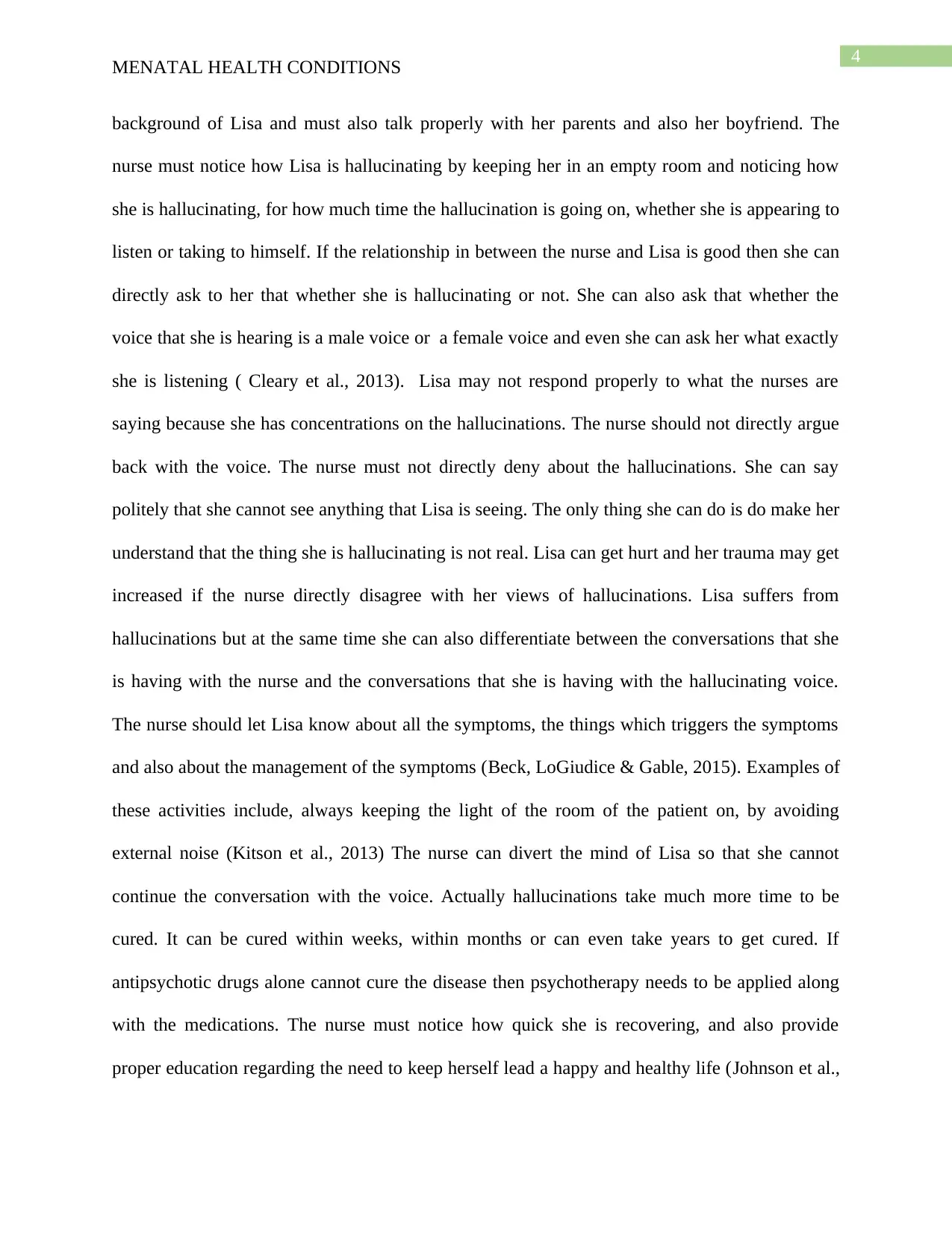
4
MENATAL HEALTH CONDITIONS
background of Lisa and must also talk properly with her parents and also her boyfriend. The
nurse must notice how Lisa is hallucinating by keeping her in an empty room and noticing how
she is hallucinating, for how much time the hallucination is going on, whether she is appearing to
listen or taking to himself. If the relationship in between the nurse and Lisa is good then she can
directly ask to her that whether she is hallucinating or not. She can also ask that whether the
voice that she is hearing is a male voice or a female voice and even she can ask her what exactly
she is listening ( Cleary et al., 2013). Lisa may not respond properly to what the nurses are
saying because she has concentrations on the hallucinations. The nurse should not directly argue
back with the voice. The nurse must not directly deny about the hallucinations. She can say
politely that she cannot see anything that Lisa is seeing. The only thing she can do is do make her
understand that the thing she is hallucinating is not real. Lisa can get hurt and her trauma may get
increased if the nurse directly disagree with her views of hallucinations. Lisa suffers from
hallucinations but at the same time she can also differentiate between the conversations that she
is having with the nurse and the conversations that she is having with the hallucinating voice.
The nurse should let Lisa know about all the symptoms, the things which triggers the symptoms
and also about the management of the symptoms (Beck, LoGiudice & Gable, 2015). Examples of
these activities include, always keeping the light of the room of the patient on, by avoiding
external noise (Kitson et al., 2013) The nurse can divert the mind of Lisa so that she cannot
continue the conversation with the voice. Actually hallucinations take much more time to be
cured. It can be cured within weeks, within months or can even take years to get cured. If
antipsychotic drugs alone cannot cure the disease then psychotherapy needs to be applied along
with the medications. The nurse must notice how quick she is recovering, and also provide
proper education regarding the need to keep herself lead a happy and healthy life (Johnson et al.,
MENATAL HEALTH CONDITIONS
background of Lisa and must also talk properly with her parents and also her boyfriend. The
nurse must notice how Lisa is hallucinating by keeping her in an empty room and noticing how
she is hallucinating, for how much time the hallucination is going on, whether she is appearing to
listen or taking to himself. If the relationship in between the nurse and Lisa is good then she can
directly ask to her that whether she is hallucinating or not. She can also ask that whether the
voice that she is hearing is a male voice or a female voice and even she can ask her what exactly
she is listening ( Cleary et al., 2013). Lisa may not respond properly to what the nurses are
saying because she has concentrations on the hallucinations. The nurse should not directly argue
back with the voice. The nurse must not directly deny about the hallucinations. She can say
politely that she cannot see anything that Lisa is seeing. The only thing she can do is do make her
understand that the thing she is hallucinating is not real. Lisa can get hurt and her trauma may get
increased if the nurse directly disagree with her views of hallucinations. Lisa suffers from
hallucinations but at the same time she can also differentiate between the conversations that she
is having with the nurse and the conversations that she is having with the hallucinating voice.
The nurse should let Lisa know about all the symptoms, the things which triggers the symptoms
and also about the management of the symptoms (Beck, LoGiudice & Gable, 2015). Examples of
these activities include, always keeping the light of the room of the patient on, by avoiding
external noise (Kitson et al., 2013) The nurse can divert the mind of Lisa so that she cannot
continue the conversation with the voice. Actually hallucinations take much more time to be
cured. It can be cured within weeks, within months or can even take years to get cured. If
antipsychotic drugs alone cannot cure the disease then psychotherapy needs to be applied along
with the medications. The nurse must notice how quick she is recovering, and also provide
proper education regarding the need to keep herself lead a happy and healthy life (Johnson et al.,
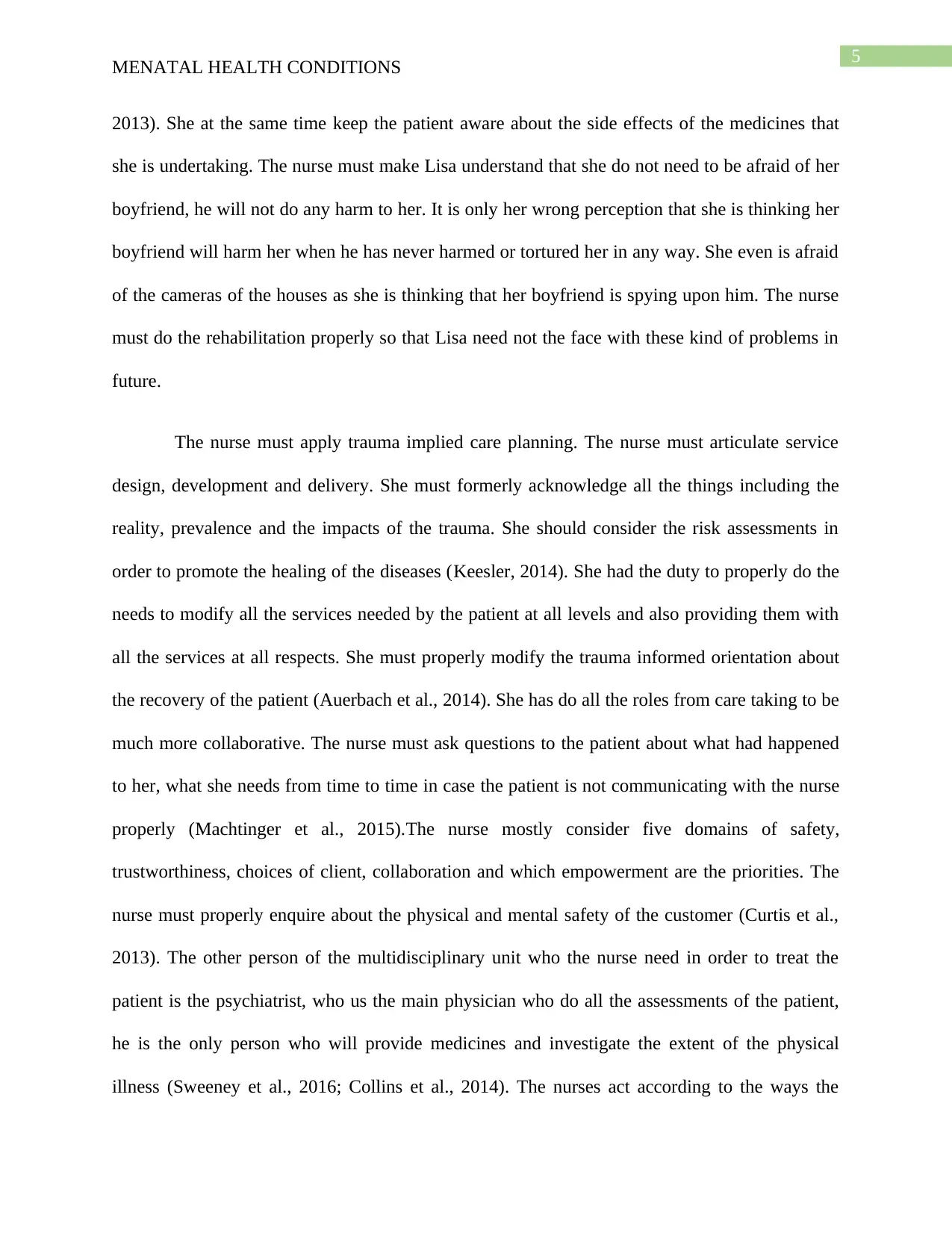
5
MENATAL HEALTH CONDITIONS
2013). She at the same time keep the patient aware about the side effects of the medicines that
she is undertaking. The nurse must make Lisa understand that she do not need to be afraid of her
boyfriend, he will not do any harm to her. It is only her wrong perception that she is thinking her
boyfriend will harm her when he has never harmed or tortured her in any way. She even is afraid
of the cameras of the houses as she is thinking that her boyfriend is spying upon him. The nurse
must do the rehabilitation properly so that Lisa need not the face with these kind of problems in
future.
The nurse must apply trauma implied care planning. The nurse must articulate service
design, development and delivery. She must formerly acknowledge all the things including the
reality, prevalence and the impacts of the trauma. She should consider the risk assessments in
order to promote the healing of the diseases (Keesler, 2014). She had the duty to properly do the
needs to modify all the services needed by the patient at all levels and also providing them with
all the services at all respects. She must properly modify the trauma informed orientation about
the recovery of the patient (Auerbach et al., 2014). She has do all the roles from care taking to be
much more collaborative. The nurse must ask questions to the patient about what had happened
to her, what she needs from time to time in case the patient is not communicating with the nurse
properly (Machtinger et al., 2015).The nurse mostly consider five domains of safety,
trustworthiness, choices of client, collaboration and which empowerment are the priorities. The
nurse must properly enquire about the physical and mental safety of the customer (Curtis et al.,
2013). The other person of the multidisciplinary unit who the nurse need in order to treat the
patient is the psychiatrist, who us the main physician who do all the assessments of the patient,
he is the only person who will provide medicines and investigate the extent of the physical
illness (Sweeney et al., 2016; Collins et al., 2014). The nurses act according to the ways the
MENATAL HEALTH CONDITIONS
2013). She at the same time keep the patient aware about the side effects of the medicines that
she is undertaking. The nurse must make Lisa understand that she do not need to be afraid of her
boyfriend, he will not do any harm to her. It is only her wrong perception that she is thinking her
boyfriend will harm her when he has never harmed or tortured her in any way. She even is afraid
of the cameras of the houses as she is thinking that her boyfriend is spying upon him. The nurse
must do the rehabilitation properly so that Lisa need not the face with these kind of problems in
future.
The nurse must apply trauma implied care planning. The nurse must articulate service
design, development and delivery. She must formerly acknowledge all the things including the
reality, prevalence and the impacts of the trauma. She should consider the risk assessments in
order to promote the healing of the diseases (Keesler, 2014). She had the duty to properly do the
needs to modify all the services needed by the patient at all levels and also providing them with
all the services at all respects. She must properly modify the trauma informed orientation about
the recovery of the patient (Auerbach et al., 2014). She has do all the roles from care taking to be
much more collaborative. The nurse must ask questions to the patient about what had happened
to her, what she needs from time to time in case the patient is not communicating with the nurse
properly (Machtinger et al., 2015).The nurse mostly consider five domains of safety,
trustworthiness, choices of client, collaboration and which empowerment are the priorities. The
nurse must properly enquire about the physical and mental safety of the customer (Curtis et al.,
2013). The other person of the multidisciplinary unit who the nurse need in order to treat the
patient is the psychiatrist, who us the main physician who do all the assessments of the patient,
he is the only person who will provide medicines and investigate the extent of the physical
illness (Sweeney et al., 2016; Collins et al., 2014). The nurses act according to the ways the
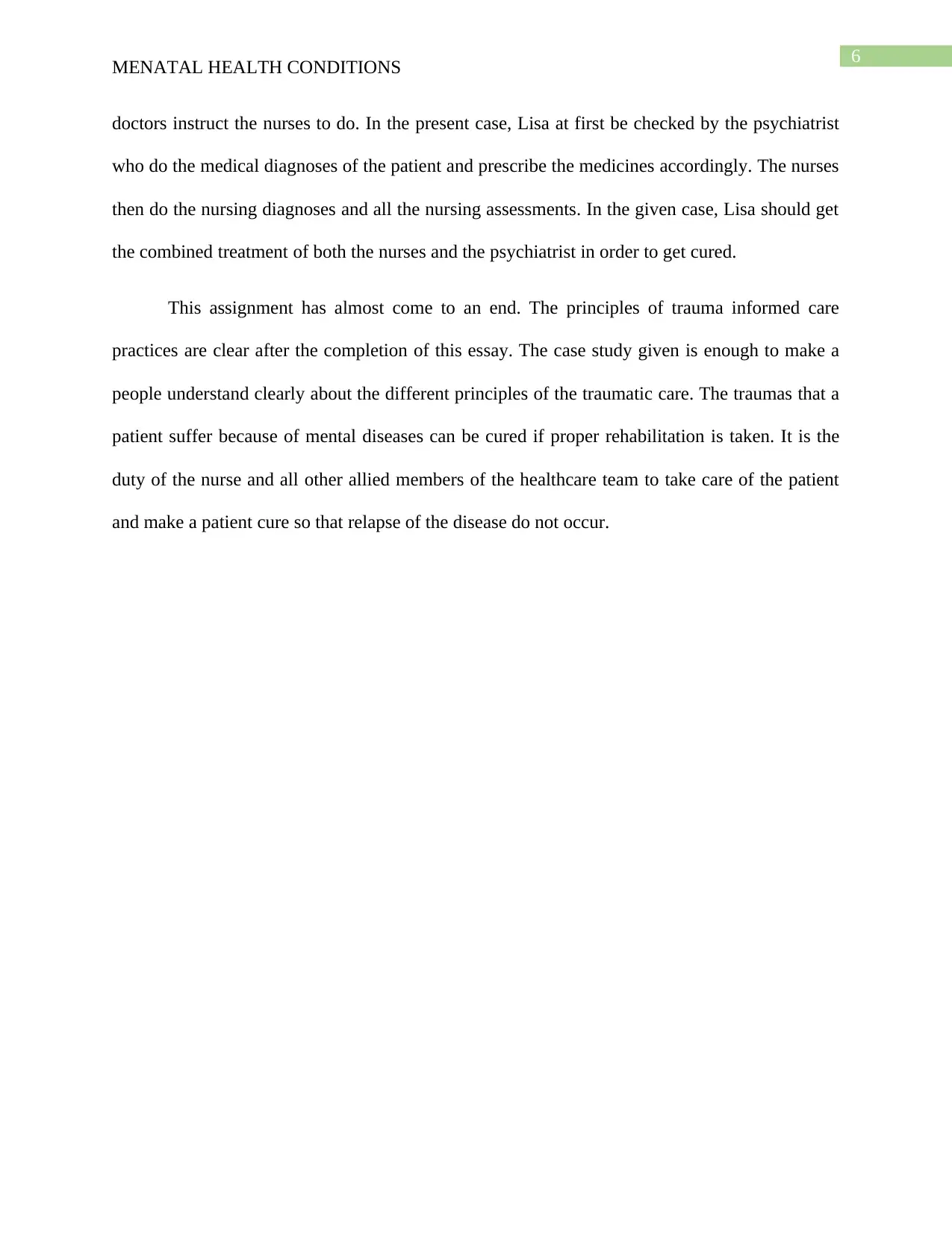
6
MENATAL HEALTH CONDITIONS
doctors instruct the nurses to do. In the present case, Lisa at first be checked by the psychiatrist
who do the medical diagnoses of the patient and prescribe the medicines accordingly. The nurses
then do the nursing diagnoses and all the nursing assessments. In the given case, Lisa should get
the combined treatment of both the nurses and the psychiatrist in order to get cured.
This assignment has almost come to an end. The principles of trauma informed care
practices are clear after the completion of this essay. The case study given is enough to make a
people understand clearly about the different principles of the traumatic care. The traumas that a
patient suffer because of mental diseases can be cured if proper rehabilitation is taken. It is the
duty of the nurse and all other allied members of the healthcare team to take care of the patient
and make a patient cure so that relapse of the disease do not occur.
MENATAL HEALTH CONDITIONS
doctors instruct the nurses to do. In the present case, Lisa at first be checked by the psychiatrist
who do the medical diagnoses of the patient and prescribe the medicines accordingly. The nurses
then do the nursing diagnoses and all the nursing assessments. In the given case, Lisa should get
the combined treatment of both the nurses and the psychiatrist in order to get cured.
This assignment has almost come to an end. The principles of trauma informed care
practices are clear after the completion of this essay. The case study given is enough to make a
people understand clearly about the different principles of the traumatic care. The traumas that a
patient suffer because of mental diseases can be cured if proper rehabilitation is taken. It is the
duty of the nurse and all other allied members of the healthcare team to take care of the patient
and make a patient cure so that relapse of the disease do not occur.
Paraphrase This Document
Need a fresh take? Get an instant paraphrase of this document with our AI Paraphraser
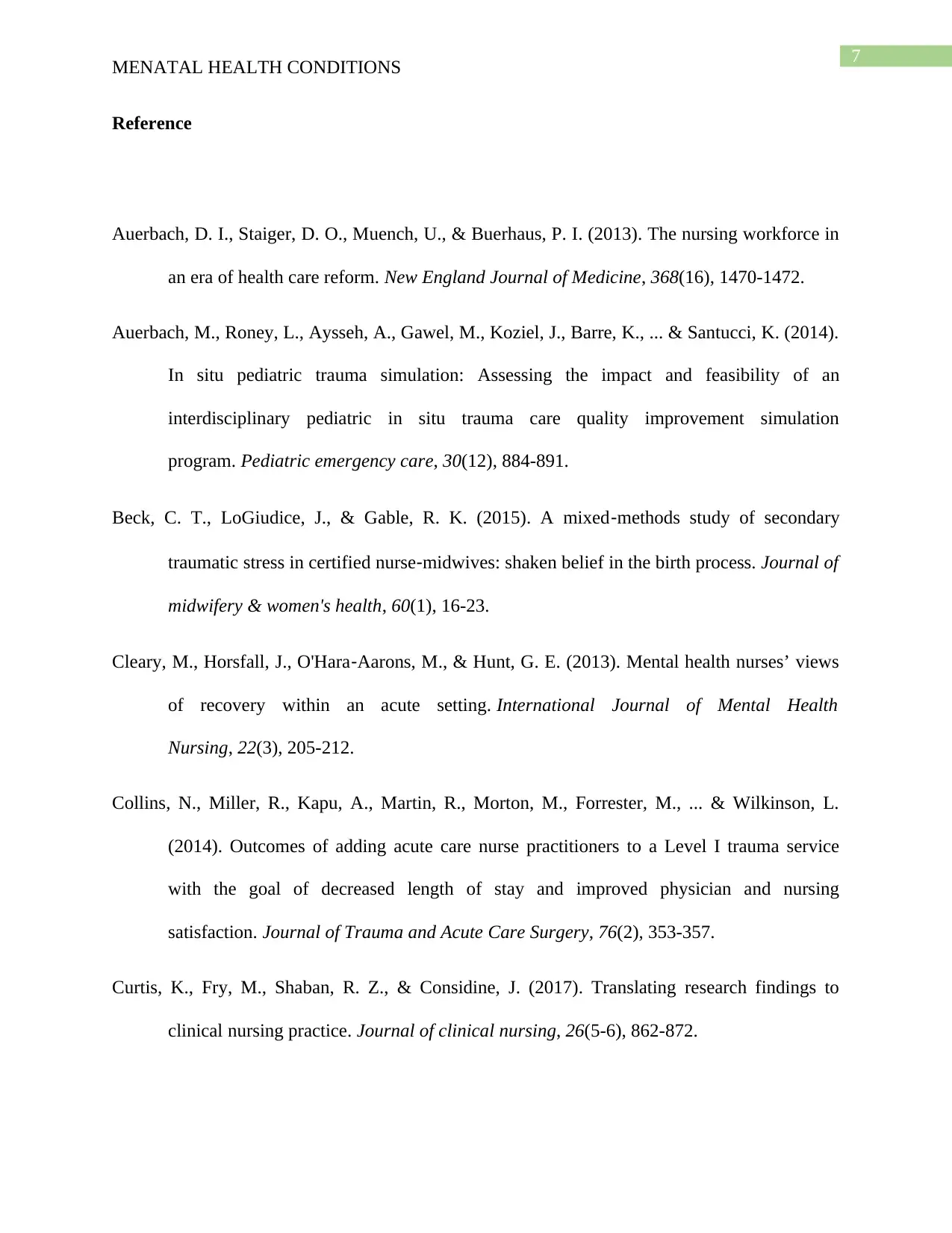
7
MENATAL HEALTH CONDITIONS
Reference
Auerbach, D. I., Staiger, D. O., Muench, U., & Buerhaus, P. I. (2013). The nursing workforce in
an era of health care reform. New England Journal of Medicine, 368(16), 1470-1472.
Auerbach, M., Roney, L., Aysseh, A., Gawel, M., Koziel, J., Barre, K., ... & Santucci, K. (2014).
In situ pediatric trauma simulation: Assessing the impact and feasibility of an
interdisciplinary pediatric in situ trauma care quality improvement simulation
program. Pediatric emergency care, 30(12), 884-891.
Beck, C. T., LoGiudice, J., & Gable, R. K. (2015). A mixed‐methods study of secondary
traumatic stress in certified nurse‐midwives: shaken belief in the birth process. Journal of
midwifery & women's health, 60(1), 16-23.
Cleary, M., Horsfall, J., O'Hara‐Aarons, M., & Hunt, G. E. (2013). Mental health nurses’ views
of recovery within an acute setting. International Journal of Mental Health
Nursing, 22(3), 205-212.
Collins, N., Miller, R., Kapu, A., Martin, R., Morton, M., Forrester, M., ... & Wilkinson, L.
(2014). Outcomes of adding acute care nurse practitioners to a Level I trauma service
with the goal of decreased length of stay and improved physician and nursing
satisfaction. Journal of Trauma and Acute Care Surgery, 76(2), 353-357.
Curtis, K., Fry, M., Shaban, R. Z., & Considine, J. (2017). Translating research findings to
clinical nursing practice. Journal of clinical nursing, 26(5-6), 862-872.
MENATAL HEALTH CONDITIONS
Reference
Auerbach, D. I., Staiger, D. O., Muench, U., & Buerhaus, P. I. (2013). The nursing workforce in
an era of health care reform. New England Journal of Medicine, 368(16), 1470-1472.
Auerbach, M., Roney, L., Aysseh, A., Gawel, M., Koziel, J., Barre, K., ... & Santucci, K. (2014).
In situ pediatric trauma simulation: Assessing the impact and feasibility of an
interdisciplinary pediatric in situ trauma care quality improvement simulation
program. Pediatric emergency care, 30(12), 884-891.
Beck, C. T., LoGiudice, J., & Gable, R. K. (2015). A mixed‐methods study of secondary
traumatic stress in certified nurse‐midwives: shaken belief in the birth process. Journal of
midwifery & women's health, 60(1), 16-23.
Cleary, M., Horsfall, J., O'Hara‐Aarons, M., & Hunt, G. E. (2013). Mental health nurses’ views
of recovery within an acute setting. International Journal of Mental Health
Nursing, 22(3), 205-212.
Collins, N., Miller, R., Kapu, A., Martin, R., Morton, M., Forrester, M., ... & Wilkinson, L.
(2014). Outcomes of adding acute care nurse practitioners to a Level I trauma service
with the goal of decreased length of stay and improved physician and nursing
satisfaction. Journal of Trauma and Acute Care Surgery, 76(2), 353-357.
Curtis, K., Fry, M., Shaban, R. Z., & Considine, J. (2017). Translating research findings to
clinical nursing practice. Journal of clinical nursing, 26(5-6), 862-872.
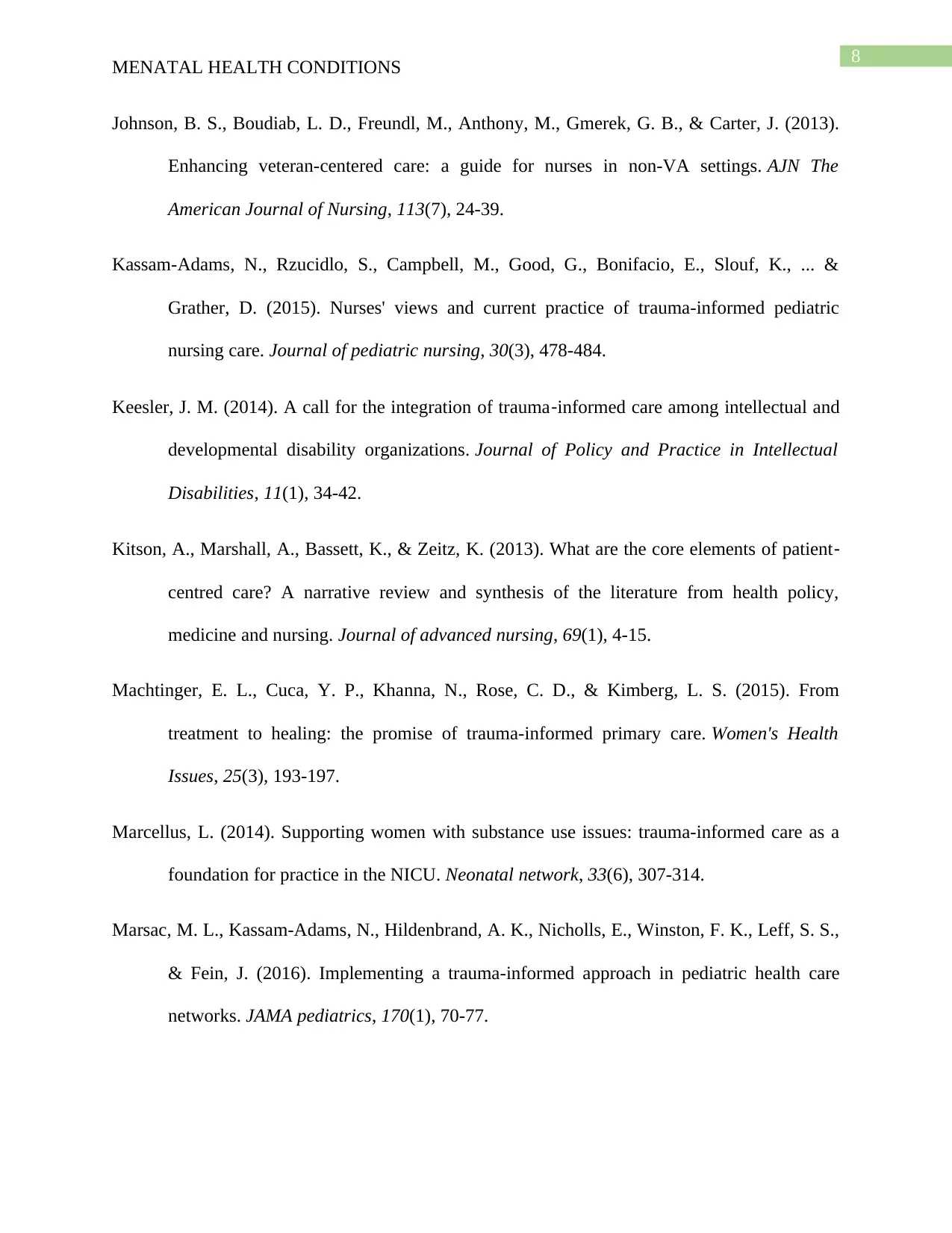
8
MENATAL HEALTH CONDITIONS
Johnson, B. S., Boudiab, L. D., Freundl, M., Anthony, M., Gmerek, G. B., & Carter, J. (2013).
Enhancing veteran-centered care: a guide for nurses in non-VA settings. AJN The
American Journal of Nursing, 113(7), 24-39.
Kassam-Adams, N., Rzucidlo, S., Campbell, M., Good, G., Bonifacio, E., Slouf, K., ... &
Grather, D. (2015). Nurses' views and current practice of trauma-informed pediatric
nursing care. Journal of pediatric nursing, 30(3), 478-484.
Keesler, J. M. (2014). A call for the integration of trauma‐informed care among intellectual and
developmental disability organizations. Journal of Policy and Practice in Intellectual
Disabilities, 11(1), 34-42.
Kitson, A., Marshall, A., Bassett, K., & Zeitz, K. (2013). What are the core elements of patient‐
centred care? A narrative review and synthesis of the literature from health policy,
medicine and nursing. Journal of advanced nursing, 69(1), 4-15.
Machtinger, E. L., Cuca, Y. P., Khanna, N., Rose, C. D., & Kimberg, L. S. (2015). From
treatment to healing: the promise of trauma-informed primary care. Women's Health
Issues, 25(3), 193-197.
Marcellus, L. (2014). Supporting women with substance use issues: trauma-informed care as a
foundation for practice in the NICU. Neonatal network, 33(6), 307-314.
Marsac, M. L., Kassam-Adams, N., Hildenbrand, A. K., Nicholls, E., Winston, F. K., Leff, S. S.,
& Fein, J. (2016). Implementing a trauma-informed approach in pediatric health care
networks. JAMA pediatrics, 170(1), 70-77.
MENATAL HEALTH CONDITIONS
Johnson, B. S., Boudiab, L. D., Freundl, M., Anthony, M., Gmerek, G. B., & Carter, J. (2013).
Enhancing veteran-centered care: a guide for nurses in non-VA settings. AJN The
American Journal of Nursing, 113(7), 24-39.
Kassam-Adams, N., Rzucidlo, S., Campbell, M., Good, G., Bonifacio, E., Slouf, K., ... &
Grather, D. (2015). Nurses' views and current practice of trauma-informed pediatric
nursing care. Journal of pediatric nursing, 30(3), 478-484.
Keesler, J. M. (2014). A call for the integration of trauma‐informed care among intellectual and
developmental disability organizations. Journal of Policy and Practice in Intellectual
Disabilities, 11(1), 34-42.
Kitson, A., Marshall, A., Bassett, K., & Zeitz, K. (2013). What are the core elements of patient‐
centred care? A narrative review and synthesis of the literature from health policy,
medicine and nursing. Journal of advanced nursing, 69(1), 4-15.
Machtinger, E. L., Cuca, Y. P., Khanna, N., Rose, C. D., & Kimberg, L. S. (2015). From
treatment to healing: the promise of trauma-informed primary care. Women's Health
Issues, 25(3), 193-197.
Marcellus, L. (2014). Supporting women with substance use issues: trauma-informed care as a
foundation for practice in the NICU. Neonatal network, 33(6), 307-314.
Marsac, M. L., Kassam-Adams, N., Hildenbrand, A. K., Nicholls, E., Winston, F. K., Leff, S. S.,
& Fein, J. (2016). Implementing a trauma-informed approach in pediatric health care
networks. JAMA pediatrics, 170(1), 70-77.
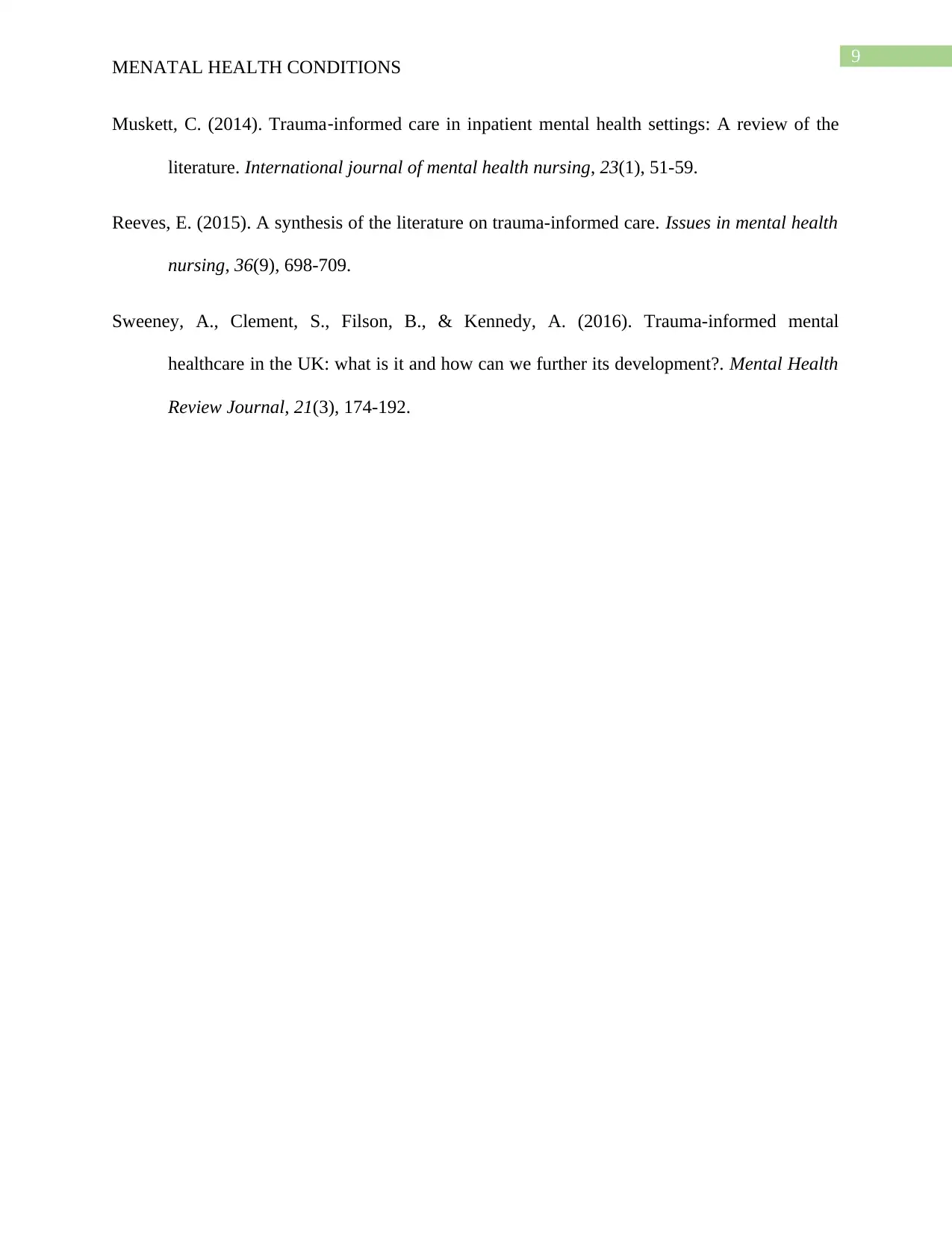
9
MENATAL HEALTH CONDITIONS
Muskett, C. (2014). Trauma‐informed care in inpatient mental health settings: A review of the
literature. International journal of mental health nursing, 23(1), 51-59.
Reeves, E. (2015). A synthesis of the literature on trauma-informed care. Issues in mental health
nursing, 36(9), 698-709.
Sweeney, A., Clement, S., Filson, B., & Kennedy, A. (2016). Trauma-informed mental
healthcare in the UK: what is it and how can we further its development?. Mental Health
Review Journal, 21(3), 174-192.
MENATAL HEALTH CONDITIONS
Muskett, C. (2014). Trauma‐informed care in inpatient mental health settings: A review of the
literature. International journal of mental health nursing, 23(1), 51-59.
Reeves, E. (2015). A synthesis of the literature on trauma-informed care. Issues in mental health
nursing, 36(9), 698-709.
Sweeney, A., Clement, S., Filson, B., & Kennedy, A. (2016). Trauma-informed mental
healthcare in the UK: what is it and how can we further its development?. Mental Health
Review Journal, 21(3), 174-192.
1 out of 10
Related Documents
Your All-in-One AI-Powered Toolkit for Academic Success.
+13062052269
info@desklib.com
Available 24*7 on WhatsApp / Email
![[object Object]](/_next/static/media/star-bottom.7253800d.svg)
Unlock your academic potential
© 2024 | Zucol Services PVT LTD | All rights reserved.





